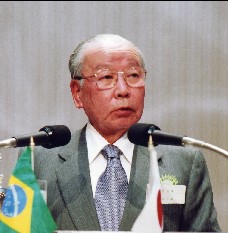The Promotion Committee for the Disaster Relief Volunteers
April 20th, 2005
Chairman of the Local Autonomy Research Organization
Mr.Nobuo Ishihara
 Our Committee was formed in July 1995 in the aftermath of the Kobe earthquake, and is a civilian organization to cultivate and register civilian volunteer groups for major disaster relief.
Our Committee was formed in July 1995 in the aftermath of the Kobe earthquake, and is a civilian organization to cultivate and register civilian volunteer groups for major disaster relief.
I believe that its activities have much in common with that of Rotary clubs.
According to seismologists, there is a real danger that serious earthquakes will occur in several regions of Japan in the near future. Over 80 years have gone by since the Great Earthquake which struck Tokyo and the Kanto area, and it is quite possible that another major quake may occur in its deep underground. For all who live in Japan we must believe that we are prone to major natural disasters.
Public administration is responsible for looking after the inhabitants in case of such disasters. Although the firefighters, police, self defense forces, maritime security forces, etc. are responsible when a major disaster strikes, the relief activities by such public organs becomes severely 1imited.
I was a member of the Cabinet 10 years ago when the Kobe earthquake struck, and was responsible for emergency activities. When such a severe earthquake underground strikes a large area, roads are disrupted, rail traffic stops and fires arise. The water supply is cut, and cars cannot move.
We have data compiled by the prefectural authorities on how the victims who were buried alive were rescued. Only 2.6% of them were rescued by official rescuers and the remainder were those rescued by their families, neighbors or passers-by, while a few were able to climb out by themselves.
Although we were criticized by our inability to do more, our firemen and Self Defense forces were unable to get through with their equipment.
The greater the disaster, those who can really come to the aid of the victims are family members and neighbors.
Many volunteers came to the victim's assistance. The quake struck on. January 17, and for a month��s period following, some 20,000 volunteers joined in providing relief. For the following month it numbered 14,000 daily, and for the 3 months following, a total of 1.1 million volunteers joined forces.
However, there were cases where the volunteer work was not effective even with the best intentions. However, where there was a leader well versed in disaster relief, the group worked very well.
��
From this experience, I thought that if we could train such leaders beforehand, they would be very effective in disaster relief.
I left my government post at the end of February after having drafted a new law regarding countermeasures for such disasters, and although I became a civilian, I could not forget the fact that training was required for volunteer leaders.
Thus, supported by friends, I was able to organize the Disaster Relief Volunteers Promotion Committee, as a totally civilian group. Some 100 firms, mainly in the Tokyo Metropolitan area have supported the organization.
Anyone can join, but we welcome persons active in our society, and college students who will soon join them. Our Training course takes 3 days and includes sessions on disaster counteraction, information gathering and conveying, artificial respiration, fire fighting, evacuation, etc. and the course takes 20 hours.
As some expenses are incurred, the trainees bear 20%, and in the past ten years, 3,700 persons have received our training. 10% of those who finish our training courses also take our advanced course.
We are now operating in Tokyo and the nearby prefectures, but would like it to become a nationwide program. But there are the issues of the training leaders and expenses, so we must confine our activities in the metropolitan area.
We do not burden the trainees with any responsibilities their primary responsibility is towards their family members in case of a disaster striking.
I asked for a paper from the trainees regarding their impressions after taking our courses, and most of them write that they would wish to serve as volunteers when a disaster strikes.
Recently, the number of college students taking our course is increasing, and I take this as a positive sign that they will become better members of our society.
We have now opened courses on college campuses. I hope that when corporations employ college graduates they will take into consideration whether the applicant has engaged in any volunteer activities. I believe that such graduates who will become future leaders should have experience and knowledge of being a volunteer.